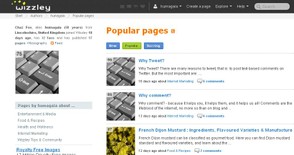Hubpages relies on search engine traffic much more so than the other two sites, Wizzley only getting 8.5% to 11% of it's traffic from this source. This means that around 90% of traffic arriving at your articles on Wizzley will be generated from directories, social media, bookmarking sites, commenting (see 'Why comment?') and other internet properties. You will do well to utilize the buttons on your article page (see 'Why Tweet?') and those on other writers' articles, until such time as the search engines give Wizzley articles more kudos. This will come with time. In the meantime, if you rely entirely on getting free search traffic you may not do so well, in terms of search engine traffic, at Wizzley.
Wizzley gets 39% of traffic from the US, whilst Squidoo and Hubpages get 33%. This means that the Wizzley US audience is greater, such that marketing to that audience is better targeted. The same is true for the UK, Canada, Australia where there is at least a 20% positive difference between the Wizzley audience and that of the other two. Europe is also a positive environment to market to.
Hubpages and Squidoo have a high proportion of visitors from low income countries in Asia. This means that average adsense value may be lower than for Wizzley. If you write for adsense income your returns per 1,000 views may well be higher at Wizzley, and may make up for the lower visitor footfall.
The audience demographics for Hubpages and Squidoo roughly equate: 18-24 female with some college education, browsing from home. Wizzley is differentiated in that, although the demographic is biased towards females browsing from home, they are more likely to be between 25 and 54 (somewhat older than for the other two), with a higher education background, and with children. This means that they are likely to have more household income that will be spent on their children and household requirements. They may also be more inclined to read and utilize information aimed at school work. Marketing these sorts of product and information may find you a customer base.
The bounce rates (where only 1 article is read for each visit) are high for Squidoo and higher for Hubpages. At 42% Wizzleys' bounce rate is just 2/3rds of that for Hubpages. This means that, once on the site, visitors are much more likely to browse additional pages. Whether this means that they do not go off and do their buying on Amazon is speculative.
Interlinking articles may be better provided for by the Wizzley modules, or the community better understands that linking articles within the site mimics what the search engines are looking for on the internet in general. A healthy linking strategy, whilst the search engines decide whether articles on the site are worthy of higher ranking kudos, is paramount for earnings for each of us, and the site in general. This is how we pay for the privilege of writing at Wizzley.


















 Gold Barson 10/19/2017
Gold Barson 10/19/2017
 Creating My Own Websiteon 02/04/2021
Creating My Own Websiteon 02/04/2021
 Weights and Measures of Gold Barson 10/20/2017
Weights and Measures of Gold Barson 10/20/2017
 Types of Goldon 10/20/2017
Types of Goldon 10/20/2017


Comments
The missing 55+ age group is missing from Wizzley because it is missing. What I mean by that is that my stats are based against the norm i.e. of those 55+ that do surf, much less of that group come to Wizzley than they go elsewhere, on average. My stats do not show that they are missing as a whole per se. Just that they do not seem to use the platforms we write on to obtain their fix.
It is relevant therefore, that if you are writing for that demographic, your articles / blogs should perhaps be produced on sites where that demographic does it's socialising. Your method of finding where your target audience resides can be undertaken using sites like Alexa. Type in each site you find that may be hiding them, the pensioners residences of the internet, and see if the audience demographics section shows you a big green graphical representation that they are there.
This is similarly true for any demographic for which you think you might be missing the target.
@LEA - I agree with you entirely with regard to the data painting a picture for the whole site, but failing to be of complete relevance when it comes to individual writers. But then each of us can look, and do look, at the 'Statistics' page on Wizzley. That gives the information that you rightly note is missing from my article.
Your target audience will benefit Wizzley, all of us, and gradually have an influence on the demographic of this site, as will mine, and anyone else that joins and makes an impact. That is the way of data: it changes perspective every millisecond. Nothing is stationary. Merely looking at it, changes it.
My take on the data, at that point in time, was that Wizzley was differentiated from S and G in significant ways, that could be taken advantage of by some, or all, of us.
It is a pleasure to link to relevant information, that I believe is presented to the benefit of anyone that reads my articles. Yours fulfilled that criterion. Why would I not link to it?
Thanks for your considered input - it adds to the overall push and shows that you are writing for your right market.
Your look at the statistics gives an interesting picture that most of us do not see or realize. I do think that some of the information is invisible though when you look at it this way. Because individual authors have different percentages of visits from the sources that you mention.
For instance over the 500 plus articles that I have on Squidoo, my search engine traffic (per Google Analytics) accounts for 64% of my traffic, with the majority of that coming from the United States.
Of course, my writing is targeted to a U.S. audience, and even more so, to a U.S. audience in a climate with four seasons.
And thanks for the link to my article. :)
Hey @Mum - great to have you come by. I know you are busy: 50+ articles in 2 months, and nearly at the magic 100 author score, way to go girl!
I like numbers. They tell a story. They speak to me.
I see trends in green........red fortune too.
I see 'em bloom ........ for me and for you
And I think to myself........what a wonderful world.
Sorry sidetracked there.
Site comparisons are a great way to delve into the depths of what is happening; where we stand; and what we can strive towards. Having these data at our fingertips can hone our minds to the task ahead. If we know where we are headed we can plan to get there. Putting together short-, medium-, and long-term plans in place, gets us to our destination, whilst allowing us to stop off and enjoy the scenery along the way. And know where we need to stop to fill up with petrol (sorry gas).
Forewarned is forearmed.
Glad to do the leg-work, glad to let everyone know.
You keep on doing what you have been doing - it will assist us all, as well as yourself and your family - I know that is what you are doing it for. Be blessed.
Great Article. It is nice to get an idea of how all the numbers stack up. You did great work comparing the sites. Thanks
@Brenda - don't, please don't narrow your target market. Just be aware of the information above and, perhaps, modify your writing slightly. I am not advocating any changes in what is written. I am only presenting the data, as it stands at this particular time. I apologise if what I have presented has misinformed you. As I noted for Sheila - demographics change - and that only occurs with a diversity of offerings (your articles).
Just be aware, akin to watching the passers-by when looking out of your shop window, what the shoppers may be looking for, in our current location. When our shop chain is opened in other locations, (new authors arriving) they may be locations on a secondary, or primary, location. The advantage of this happening is that a different demographic is generated, and more footfall arrives. If the bounce rate stays low, it can be inferred that everybody here will benefit by association.
Demographics change - your articles may be the cause of that change. Wizzley needs to be assisted in accessing both the secondary and primary markets, whilst keeping a firm foothold in the market for which it already satisfies a need. We, as writers, satisfy needs. We just need to satisfy more of them, whilst not alienating those that have been loyal to our brand.
All power to your elbow - keep writing - and thanks for your comment - it is the only way I can gauge whether I am getting my points across successfully, and to address any misconceptions and oversights.
@Sheila - it is one thing knowing which audience is available to you, but this should not override who you target as your audience: demographics change. The audience you are likely to receive at the moment, from casual footfall on Wizzley (i.e. that attracted to the site by Wizzley and it's current authors), is as above. As the author demographic matures, it will likely change - the equivalent of moving a shop from a tertiary location, to a secondary, and then a primary location. A different demographic is encountered in these circumstances. From footfall looking for specialist products (tertiary); to those looking for semi-mainstream products (Secondary); to those who window shop (and buy) products from the national and multi-national shop chains (primary). Wizzley is currently on the back streets (tertiary) and is of interest to that demographic. We all would like it to move up to a secondary and then primary 'location'. This will come, with time, and the demographics will change accordingly. To effect that change we should write to each of our target audience, but be aware of our location at the same time.
What I am saying is that you should be aware of where we are located; not expect too much if you are marketing for the primary market; be ensured that having a foothold in that primary market will pay dividends, as Wizzley matures; and that, if you rely on footfall generated by others on the site, you are likely best writing at Wizzley, as the 'shoppers' peruse more other 'shops' along our street, than at Hubpages or Squidoo.
Data is one thing: how to interpret it, quite another.
Statistics eh! Who needs them?
Sheila, thanks for passing by and taking your time to comment.
Katie.......and so on ..... included a SHOUTOUT on the forum. I thank you for liking my article so much that you felt it useful to others, and made them aware of it. As you can see from the comments, some have already arrived and gleaned some use out of it.
As you, I love researching and passing on my findings. I am also so pleased that you trust what I write. That is a great burden (a good one) to live up to. I shall endeavor to live up to that.
It is likely that most people at Wizzley are writing for the 'right' market, as they are the people that caused the demographic.
Be well (you know what I mean) - read lakeerieartists article (noted in the text above) - and thanks again.
Thank you for doing all the leg work for us. I tend to write all over the place. I'll narrow it down now.
Thanks for passing on this data. Helpful info for us to target our articles to what the people are looking for.